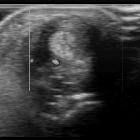Extensor carpi ulnaris tendinopathy















Extensor carpi ulnaris (ECU) tendinopathy is varied and includes tendinosis, (stenosing) tenosynovitis, tendon instability, and (rarely) rupture.
Epidemiology
Athletes at increased risk of ECU tendinopathy include those who participate in :
- racquet sports, e.g. tennis
- club sports, e.g. golf
- high-impact contact sports, e.g. rugby
Clinical presentation
Patients typically present with ulnar-sided wrist pain and/or pain on wrist extension. Localized swelling may be present.
A positive ECU synergy test appears sensitive although not 100% specific for ECU tendinopathy. With the elbow in 90º flexion and the forearm in full supination, resistance to thumb abduction with counter pressure on the middle finger. Reproduction of dorsal-ulnar wrist pain is considered positive for ECU tendinopathy although the test may also be positive for triangular fibrocartilage complex or lunotriquetral pathology .
Pathology
Numerous pathologies can affect the ECU tendon :
- tenosynovitis
- causes by repetitive wrist flexion/extension, especially in supination
- in non-athletes, consider rheumatoid arthritis
- stenosing tenosynovitis is rare
- tendinosis
- results from overuse
- tendon instability
- ranges from subluxation to gross dislocation
- results from ECU subsheath injury/dysfunction
- usually the result of single acute trauma
Radiographic appearance
Ultrasound and MRI are the mainstays of ECU tendon imaging, with ultrasound offering the advantage of dynamic assessment, Doppler interrogation for inflammation, and assessment of the contralateral ECU tendon .
Differential diagnosis
Other causes of ulnar-sided wrist pain should be considered such as :
- triangular fibrocartilage complex injury
- lunotriquetral ligament injury
- distal radio-ulnar joint arthropathy
- ulnar styloid fracture
Practical points
- ECU tendon sheath becomes more prominent distal to the ulnar styloid and should not be mistaken for tenosynovitis
Siehe auch:
- Rheumatoide Arthritis
- Sehnenfächer Handgelenk
- Tendovaginitis stenosans de Quervain
- Tendovaginitis
- Intersektionssyndrom
- Musculus extensor carpi ulnaris
- Cheiralgia paresthetica
und weiter:

 Assoziationen und Differentialdiagnosen zu ECU rupture:
Assoziationen und Differentialdiagnosen zu ECU rupture:



